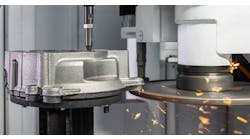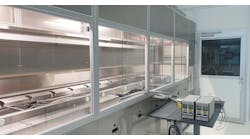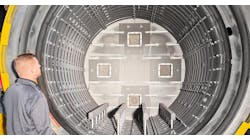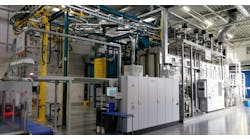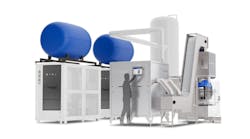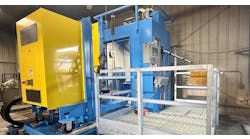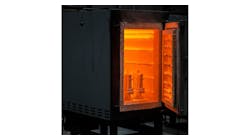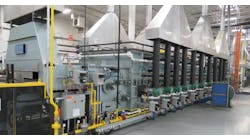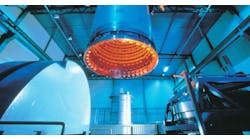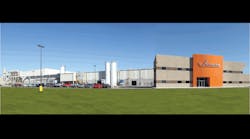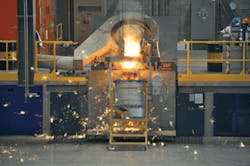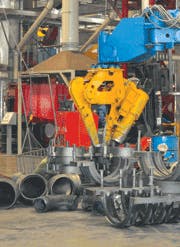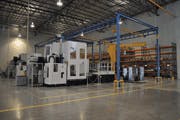Manufacturing castings for its fluid product lines on a global scale means that Victaulic has many decisions to make, and many quality objectives to reach. So, when it sought to increase production of custom castings it concluded it had to build a new, integrated operation to produce larger-dimension products. It selected a site in Chihuahua, Mexico, and in the second half of 2011 the new ductile iron foundry started producing custom castings and large-diameter pipe-joining products for distribution in the U.S., Mexico, Latin America, and South America.
The new plant — which is the largest among the group's 11 manufacturing operations worldwide — also has machining, fabricating, and assembly operations for Victaulic's mechanical pipe joining products. The decisions that shaped the new operation offer insights to the choices that metalcasters face when they set out to coordinate their particular manufacturing requirements with the demands of a global supply chain.
Building capability
Victaulic's newest foundry supplements its global capabilities, but it allows the company to produce a much wider range of castings and perform more finishing services than the company has ever been able to offer before. With other foundries already well established in the U.S., Canada, China, and Poland, Victaulic sought to maintain its emphasis on local production, with global reach, combined with thorough quality control. Upholding these principles ensures that Victaulic castings manufactured in any location consistently meet the same exceptional global standards.
The major difference between the Chihuahua operation and the other Victaulic foundries is the size of the castings it produces. It pours ductile iron grades 65-45-12 and 80-55-06, as well as gray iron into 1,200-lb. no-bake molds, at up to 10 molds per hour, and it has a minimum casting yield up to 3,000 lb. (1,360 kg.)
"There are very few companies able to produce castings of this size," explained Victaulic vice president Didier Vassal. "Our customers are looking for us to demonstrate the ability to manufacture products to the same high standards at all our plants. Now, our capacity and capabilities have increased and we can offer the large castings that clients have found very difficult to source."
Despite a lackluster economy, global demand for ductile iron castings remains strong – in particular for OEM, rail, and vehicle sectors. The Chihuahua foundry is positioned to serve an expanding market, and sits in a purpose-built industrial park benefitting from a local pool of skilled labor. In the years to come, Victaulic expects its manufacturing emphasis to be on pump and compressor housings, large valve parts, and vehicle parts. However, a range of other custom castings also will be produced on a regular basis, for distribution across North and South America.
"The site supplements existing operations and is not intended to supplant our existing facilities, either in the U.S. or worldwide," Vassal detailed. "It is very much part of a new, bigger global plan."
Larger than life
In expanding its capabilities Victaulic is responding to rising global demand from customers that expect the same high-quality manufacturing standards and service wherever they need castings. There are only a handful of foundries able to manufacture castings in the very large sizes — up to 72 in. (1,825 mm) diameter and 3,000 lb (1,360 kg) — that the Chihuahua site now offers.
The range of equipment chosen for the large-scale product line includes ABP Induction pouring technology and Omega Foundry Machinery Ltd. rollover mold handling systems. The plant's entire sand handling system was engineered and supplied by Tinker Omega Manufacturing LLC, wtih the Rollover, Flow Coat and Reclamation plant built by its sister company, Omega Foundry Machinery Ltd.
The no-bake mold operation uses sand combined with liquid resin and a catalyst. The cold-setting process (sand is not rammed, but rather poured into the mold and left to solidify) was adopted for several reasons, including a high-quality casting surface finish, but also because the sand molds can be recycled and surplus metal can be recovered.
To meet its customers exacting specifications and to maintain high levels of product quality, the foundry finishes its products on Toshiba vertical turret lathes (94.5-in./240-cm maximum part diameter, 67.7-in./172-cm maximum part height) that "attack" a rotating workpiece with fixed cutting tools. Also in use are Toshiba horizontal boring mills — 89 ×89×64 in. (W×D×H) machine envelope and 2.5-minute pallet shuttle — to finish stationary parts with rotating cutting tools.
"We really are talking about a state-of-the-art facility here," Vassal posited. "There are very few foundries globally that can match the capabilities we have installed in Chihuahua to produce custom castings, especially at this size and weight."
The almost 30-acre site has 119,600 square feet of manufacturing space on the foundry floor, with offices and administrative space covering another 13,450 square feet.
While some other foundries may have scaled back, Victaulic has increased its investments in manufacturing, Vassal said. "In addition to the venture in Chihuahua, last year we invested in our European facilities, and globally Victaulic is investing heavily in all its capabilities. We have strived to produce the highest-quality castings and this has always ensured business is strong, even in more difficult economic times."
Site selection
Choosing a location for such a large-scale investment was not easy, and numerous checks and inquiries were carried out at every stage in the process. In Chihuahua, Victaulic found a site for large-sized castings production, well positioned and connected to the established (but under-supplied) U.S. markets and the burgeoning demand in South America. It is close to the city of Chihuahua and its international airport, and about 230 miles by road from El Paso, TX. It's also well connected by the Chihuahua-Pacific Rail Road and the local interstate highway.
Building on a new site ensured sufficient room for expansion, but also the ability to optimize the operations. Situated in a new industrial development, Victaulic chose to add its own electric substation, so high-volume power consumption is no issue. It has done the same with its other foundries.
Notwithstanding the scale of the new installation, time was the biggest challenge to the project. "Our desire was to meet customer needs and get the timeframe as short as possible," explained Wayne Holmberg, Victaulic's manager of facilities engineering. "But, we are still talking about two years of very detailed planning with many design iterations reviewed before we optimized and chose the best one, conforming to local codes, FM approvals, and also stringent international standards."
Holmberg was among a group of technical experts, engineers, and foundry consultants heavily involved in the planning, construction, and start-up, and working to ensure that everything went according to plan.
The local climate, with its unusually dry conditions, presented some difficulties because of soil quality. A lot of improvement had to be carried out to prepare the base material that would compact properly before real building work could get underway.
With the location also came the risk of tropical storms, precautions for which had to be designed into the plant. Also, the high-desert site (altitude 4,900 ft.) does not normally have much water available, and when rain comes it can be torrential, so storm drainage was extremely important. Victaulic partnered with a design-build contractor to optimize the greenfield development process, maintaining the construction schedule.
Sustainability and quality
Victaulic is committed to its environmental responsibilities and contends the Chihuahua operation will be one of the cleanest foundries in the world, with maximum energy efficiency employed at all stages of production. As noted, it uses thermal reclamation to recover spent sand, while dust cleaners lessen the environmental impact of the process and improve working conditions. Using scrap metal means that 90% of the plant's output can be identified as recycled material, and Victaulic used special painting techniques to reduce the impact of volatile organic compounds (VOCs.)
"Sustainability is becoming a more important factor for our customers," Vassal asserted, "and, worldwide we are increasingly addressing this in our projects. For instance, we now have an environmental manager working exclusively on improving dust extraction in our foundries.
"Quality is the key to what we do at Victaulic, as it is for our customers," said Vassal. "As a company we are committed to outstanding levels of customer service."
In addition to its environmental commitment, quality control is central to Victaulic's objectives. The company now has a director of global quality and process technology who not only organizes regular audits but holds seminars to promote best practices — all to ensure quality controls are established consistently worldwide.
The Mexico team benefits from this experience, and is able to ensure that the right people with the right training are on the floor at all times, checking output and carrying out regular inspections, and delivering to the same high standards as in all Victaulic foundries.
Other advantages are more widely dealt. The Victaulic group is able now to extend its design optimization service – which helps to reduce the weight and cost of castings while maintaining performance – beyond its current clientele and foundries, to include larger-sized castings. Just-in-time logistics systems will allow Victaulic's customers to schedule deliveries that minimize their own inventories, and therefore exposure to risk.
Through successful planning and attention to detail, the process of integrating the foundry's output with the company's supply chain was very smooth, with no bottlenecks – only tight lead times that have been met.
Recalling the path to start-up last October, Vassal noted that the Mexican plant "moved very swiftly into production."
Victaulic, with its longstanding expertise, has always been associated with high-quality precision castings," he said. "Thanks to this new investment the company will continue to be associated with quality castings but now on a much larger scale."
